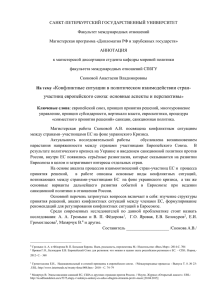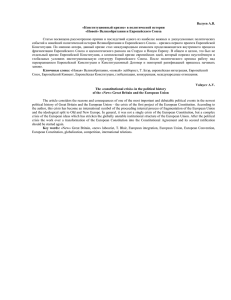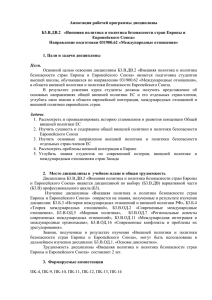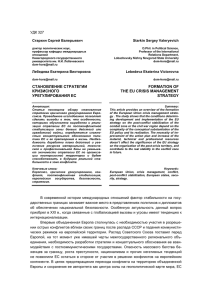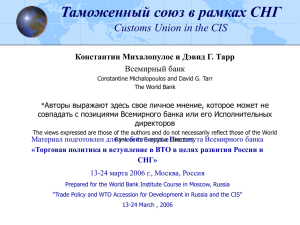ЗАДАНИЕ: Объединенная Европа: За и против Европейский союз
реклама
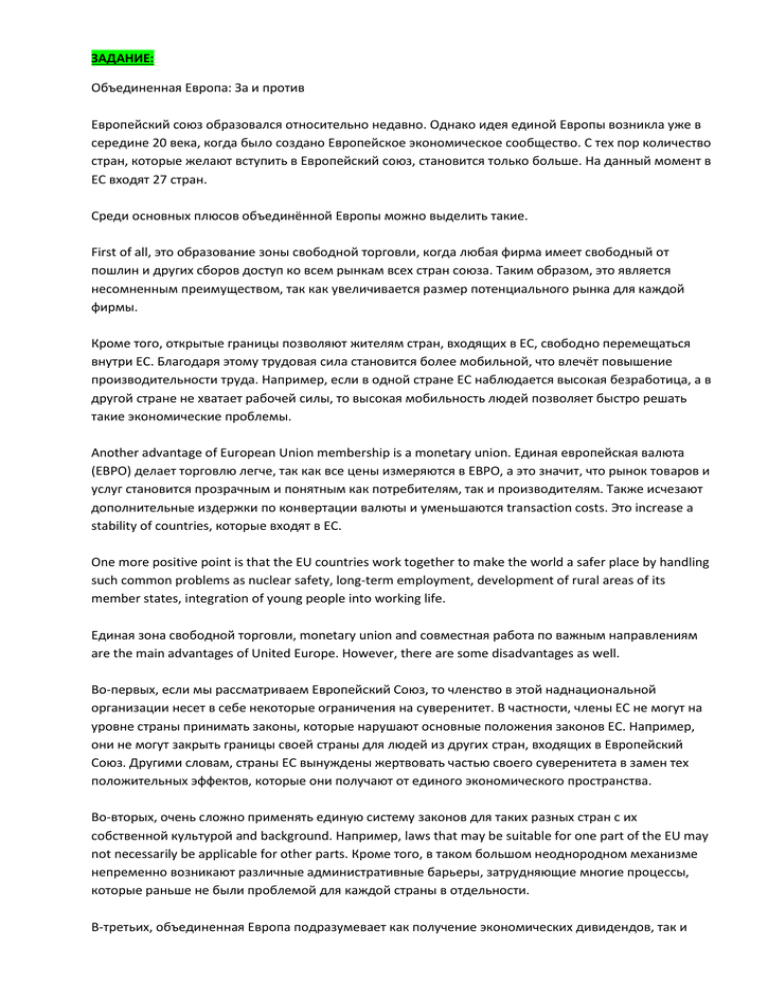
ЗАДАНИЕ: Объединенная Европа: За и против Европейский союз образовался относительно недавно. Однако идея единой Европы возникла уже в середине 20 века, когда было создано Европейское экономическое сообщество. С тех пор количество стран, которые желают вступить в Европейский союз, становится только больше. На данный момент в ЕС входят 27 стран. Среди основных плюсов объединённой Европы можно выделить такие. First of all, это образование зоны свободной торговли, когда любая фирма имеет свободный от пошлин и других сборов доступ ко всем рынкам всех стран союза. Таким образом, это является несомненным преимуществом, так как увеличивается размер потенциального рынка для каждой фирмы. Кроме того, открытые границы позволяют жителям стран, входящих в ЕС, свободно перемещаться внутри ЕС. Благодаря этому трудовая сила становится более мобильной, что влечёт повышение производительности труда. Например, если в одной стране ЕС наблюдается высокая безработица, а в другой стране не хватает рабочей силы, то высокая мобильность людей позволяет быстро решать такие экономические проблемы. Another advantage of European Union membership is a monetary union. Единая европейская валюта (ЕВРО) делает торговлю легче, так как все цены измеряются в ЕВРО, а это значит, что рынок товаров и услуг становится прозрачным и понятным как потребителям, так и производителям. Также исчезают дополнительные издержки по конвертации валюты и уменьшаются transaction costs. Это increase a stability of countries, которые входят в ЕС. One more positive point is that the EU countries work together to make the world a safer place by handling such common problems as nuclear safety, long-term employment, development of rural areas of its member states, integration of young people into working life. Единая зона свободной торговли, monetary union and совместная работа по важным направлениям are the main advantages of United Europe. However, there are some disadvantages as well. Во-первых, если мы рассматриваем Европейский Союз, то членство в этой наднациональной организации несет в себе некоторые ограничения на суверенитет. В частности, члены ЕС не могут на уровне страны принимать законы, которые нарушают основные положения законов ЕС. Например, они не могут закрыть границы своей страны для людей из других стран, входящих в Европейский Союз. Другими словам, страны ЕС вынуждены жертвовать частью своего суверенитета в замен тех положительных эффектов, которые они получают от единого экономического пространства. Во-вторых, очень сложно применять единую систему законов для таких разных стран с их собственной культурой and background. Например, laws that may be suitable for one part of the EU may not necessarily be applicable for other parts. Кроме того, в таком большом неоднородном механизме непременно возникают различные административные барьеры, затрудняющие многие процессы, которые раньше не были проблемой для каждой страны в отдельности. В-третьих, объединенная Европа подразумевает как получение экономических дивидендов, так и солидарную ответственность во время кризиса. Таким образом, финансовые проблемы нескольких членов ЕС ставят под угрозу существование всего блока and богатые страны like Germany вынуждены to pay for the economic mistakes of other countries. Наконец, большая бюрократическая машина, созданная для управления ЕС, не способна быстро реагировать на проблемы, возникающие как внутри союза, так и за его пределами. Это связано с тем, что все значимые решения принимаются коллективно всеми странами - членами ЕС, а это не только снижает гибкость системы, но и повышает экономические и социальные риски внутри каждой страны. Обобщая всё вышесказанное, не смотря на то, что сегодня Европейский Союз сталкивает с большими финансовыми трудностями и богатые страны вынуждены поддерживать экономику стран, находящихся на грани банкротства, существуют несомненные преимущества Европейского Союза, которые позволяют говорить о сильной и стабильной объединённой Европе в долгосрочной перспективе. ПЕРЕВОД: United Europe: Pros & Cons The European Union has been created relatively recently. However the idea of the united Europe started up already in the middle of the 20-th century, when the European Economic Community was created. Since then the number of countries which wants to join the European Union has only been increasing. Nowadays there are 27 countries in the EU. We can emphasize the following main advantages of Europe being united. First of all, this is the formation of the free market that means any firm has an access to all the markets of all the countries-members of the European Union free from any duties and other charges. Thus, this is an apparent advantage because each such a firm gains a potential market. Besides, the open borders allow the citizens of the countries-members of the EU to float without any restrictions across the EU. Due to that the labor becomes more mobile that results in development of labor productivity. For example, if in one country-member of the EU a heavy unemployment is observed and the other country comes short of labor then an active mobility of people allows to deal with such economic problems quickly. Another advantage of the European Union membership is a monetary union. It is more convenient to do commercial business applying Common European Currency (EURO), because all prices are understood in EURO, and it means that the goods and services market becomes transparent and simple to both consumers and producers. Also Common European Currency allows to save the extra currency conversion costs and to reduce transaction costs. The countries-members of the EU become stable. Another positive point is that the countries-members of the EU work together to make the world a safer place by handling such common problems as nuclear safety, long-term employment, development of rural areas of its member states, integration of young people into working life. The common free market, the monetary union and the united efforts aimed at the important issues are the main advantages of being a member of the EU. However, there are some disadvantages as well. At first, if the European Union is regarded, then it should be understood that the membership in this supranational organization means certain restrictions on sovereignty. In particular, the members of the EU cannot enact the domestic legislation that contravenes the fundamental provisions of the EU legislation. For example, they cannot close the border of the country for people from other countries-members of the European Union. In other words, the countries-members of the EU have to lose a part of their sovereignty in return for those advantages from being a member of the Common Free Market. Secondly, it is very difficult to apply the common legislative system for such different countries with their own culture and background. For example, laws that may be suitable for one member of the EU may not necessarily be applicable for other member. Besides, certainly in such a large heterogeneous mechanism there are different administrative barriers, which hamper many processes though before they came easy for each country apart. Thirdly, being a part of the United Europe means both the economic dividends and joint and several liability when there is a crisis. Thus, the financial problems of some members of the EU endanger the Union existence as a whole and the rich countries like Germany have to pay for the economic mistakes of other countries. Finally, a large bureaucratic apparatus, created to manage the EU, cannot respond quickly to the problems, those which are arising up both into the Union and outside of it. For example, that happens because all the significant decisions are reached by all the countries - members of the EU collectively, and it does not only weaken the system flexibility but also increases the economic and social risks within each country. Summarizing all the aforesaid, notwithstanding that today the European Union meets the serious financial pressure and the rich countries have to support the economy of the countries which are on the verge of bankruptcy, there are the undoubted advantages of the European Union, which allows suggesting that the United Europe will be strong and stable in the longer term.
